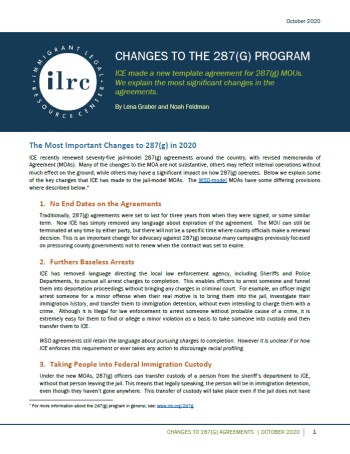
ICE has changed the standard language for 287(g) agreements. This resource highlights and explains the most significant changes and provides a line by line comparison of old and new contracts.

This one-pager, a partnership between the UCLA Criminal Defense Clinic, Al Otro Lado, and the ILRC, describes the how and why of CA Penal Code s. 1473.7.

In 2020 and 2021, the ILRC generated three distinct social media pushes on public charge and four “breaking news” graphics to educate the immigrant community on policy developments and related issues. In this resource, we share information on those pushes and links to the graphics on Instagram as inspiration for social media posts other organizations or advocates may wish to share or create, depending on their audience.
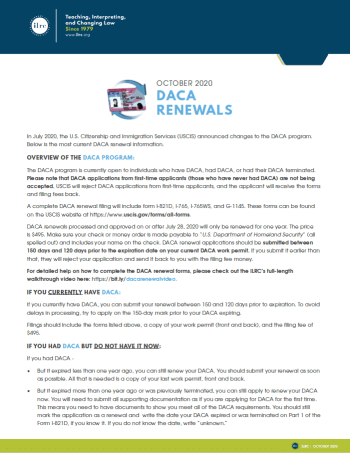
This community resource is a condensed explainer for anyone with questions about DACA, with a brief overview on who can apply, who can renew, and what the recent USCIS changes to the program mean.
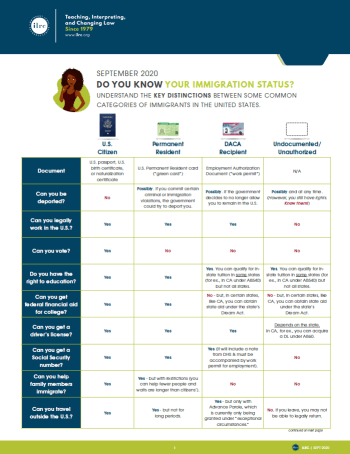
For many immigrants, learning what their status is does not come into full scope until they apply for driver’s licenses, financial aid, travel documents, or other benefits that are a part of adulthood’s accompanying responsibilities. Regardless of one’s age, however, it is important that everyone understand the differences between the distinct categories recognized by the federal government so as to be well informed and exercise caution throughout daily life.

Across the country, states and localities are increasingly moving to end marijuana prohibition laws. For immigrant communities, despite the changing attitude toward marijuana-related conduct at the state level, an old conviction can still form the basis for immigration-related consequences at the federal level. Though federal legal reforms may be the only way to completely eradicate the immigration consequences of marijuana-related conduct and convictions, reforms at the state level can nevertheless help stop the arrest-to-deportation pipeline. Drawing from our experience with state and municipal efforts across the country, this resource, jointly produced by the Immigrant Legal Resource Center, the Immigrant Defense Project, and the Drug Policy Alliance, lists best practices for municipalities and states looking to decriminalize in a way that lessens the immigration-related harms of marijuana criminalization.
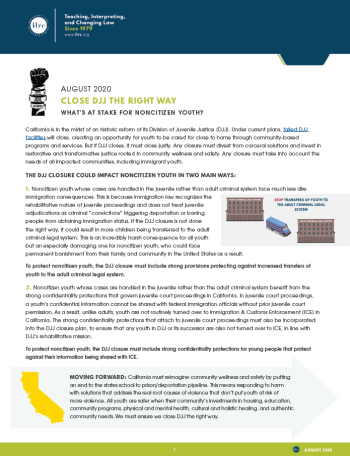
California is in the midst of an historic reform of its Division of Juvenile Justice (DJJ). Under current plans, failed DJJ facilities will close, creating an opportunity for youth to be cared for close to home through community-based programs and services. But if DJJ closes, it must close justly. Any closure must divest from carceral solutions and invest in restorative and transformative justice rooted in community wellness and safety. Any closure must take into account the needs of all impacted communities, including immigrant youth. This resource highlights the two main ways that noncitizen youth may be impacted by the DJJ closure and makes recommendations to ensure that DJJ closes justly for all.

A one-page issue spotting decision tree to help screen for potential forms of post-conviction relief. For an in-depth discussion of any of these vehicles, see this guide, created by the ILRC and Californians for Safety and Justice.
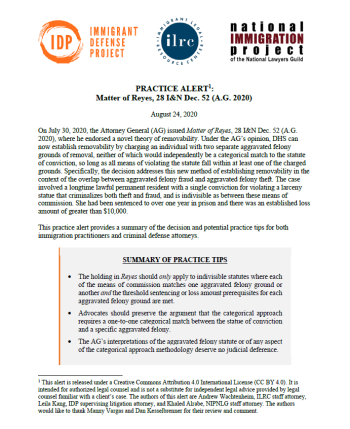
On July 30, 2020, Attorney General Barr issued Matter of Reyes, 28 I&N Dec. 52 (A.G. 2020), a case involving a longtime lawful permanent resident with a single conviction for violating a larceny statute that criminalizes both theft and fraud, and is indivisible as between these means of commission. She had been sentenced to over one year in prison and there was an established loss amount of greater than $10,000. This practice alert provides a summary of the decision and potential practice tips for both immigration practitioners and criminal defense attorneys representing noncitizens in criminal and immigration cases. These tips focus on challenging the correctness of the AG's new theory of removability, challenging any judicial deference to the AG's opinion, fighting DHS efforts to file new NTAs or motions to reopen past proceedings, contesting retroactive application of the new decision, and criminal defense strategies for avoiding its reach in advising noncitizens on resolving open criminal matters.
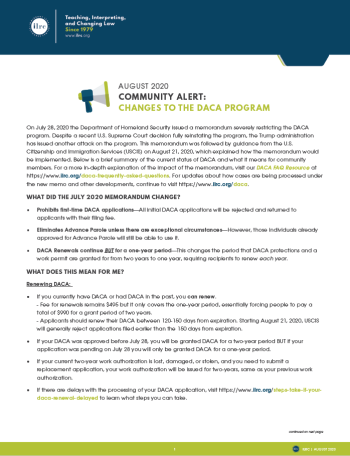
On July 28, 2020 the Department of Homeland Security issued a memorandum severely restricting the DACA program. Despite a recent U.S. Supreme Court decision fully reinstating the program, the Trump administration has issued another attack on the program. This community alert gives a brief summary of memorandum and the U.S. Citizenship and Immigration Services Implementing Guidance issued on August 21, 2020 and what it means for community members.